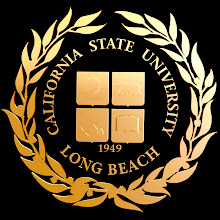California State University, Long Beach (CSULB) marked 40 years of assisting children with disabilities with a special celebration that recognized a pair of on-campus programs and those who have participated in them.
“I began thinking that 40 years was a pretty big milestone and we were the first program of this kind west of the Mississippi in 1969-70,” said Barry Lavay, a professor in CSULB’s Department of Kinesiology (KIN) where his primary responsibility is to train students to teach physical education to individuals with disabilities. “I thought it would be a good idea to have this celebration.”
The 40th anniversary is as much a celebration of those who have participated in the program as the program itself, according to Lavay, who credits former CSULB faculty members Andy Sinclair and Dan Arnheim for having the vision to start the program.
“When I look at this program, it accomplishes three things,” he said. “It provides training for university students who are studying to be adapted physical education teachers, it provides physical activity for children with disabilities, and it’s a great university public relations tool because of what we are giving back to the community.”
Lavay also coordinates the State Adapted Physical Education Teaching Credential Program where more than 250 students have received a California APE Specialist Credential since 1988. He notes that anybody who has been credentialed in Adapted Physical Education from CSULB since 1970 has worked in the programs and received valuable hands-on experience in learning to work with children with disabilities.
The after-school program is held on Tuesdays and Thursdays, from 3:45-4:45 p.m. throughout the academic year. It offers two 10-week, 20-session programs to children ages 6-12 with disabilities and gross motor delays. Provided is both small group (2:1 or 1:1 child/staff ratio) and group instruction by university students studying in the Department of Kinesiology and working toward an adapted physical education specialist credential. Individualized and group instruction emphasizes gross motor fundamental skills, cooperative lead-up games, sports, relaxation activities and social interaction.
Camp Nugget, a four-week, three-hour-a-day program which normally begins the last week of June and runs into July, is offered to children ages 5-12 with disabilities and special needs. Small group instruction with a 4:1 child/staff ratio is again provided by adapted physical education specialist credential students. Camp activities include aquatics with swim instruction, instruction in fundamental skills and lead-up cooperative games, outdoor adventure course and adapted sports.
“The after-school program has been run under different names over the years and is really just an extension of the summer camp we run,” said Lavay. “I’ve run the camp and the after-school program since 1988, so there are many similarities because we are providing quality physical activity instructions for children with disabilities. In the summer, if a child needs intense one-on-one instruction, we’re not set up for that, but we work on a very small ratio of 4.5 children to every counselor. In the after school program, it’s usually one-on-one or one-on-two. But we also do group activities because they need to learn to socially interact and cooperate with other children.”
Lavay said he enjoys the work. It is rewarding to see his students grow in their teaching, and he also enjoys giving back to the community.
“It’s also really good training. Students need practical experience, they need hands-on experience, they need the opportunity to combine theory with practice and theory comes alive when they work with a child who has a disability,” he pointed out. “Kids with disabilities are real receptive to receiving instruction. I mean it’s challenging sometimes and there’s some real unique behaviors that some of the children exhibit, but it’s rewarding.”
Lavay estimated that since the programs’ beginning in 1970, more than 2,500 disabled youth with disabilities have participated.
“Opportunities for children with disabilities have increased tremendously since 1970, but still it’s challenging when you are a parent and you’re trying to find services for your child with special needs,” said Lavay. “With us they know they are going to get a quality program. There are public school and recreational programs for these kids, but the reality is that there are not a lot of programs like ours in Southern California where universities are involved.”
-- Shayne Schroeder
Subscribe to:
Post Comments (Atom)




No comments:
Post a Comment